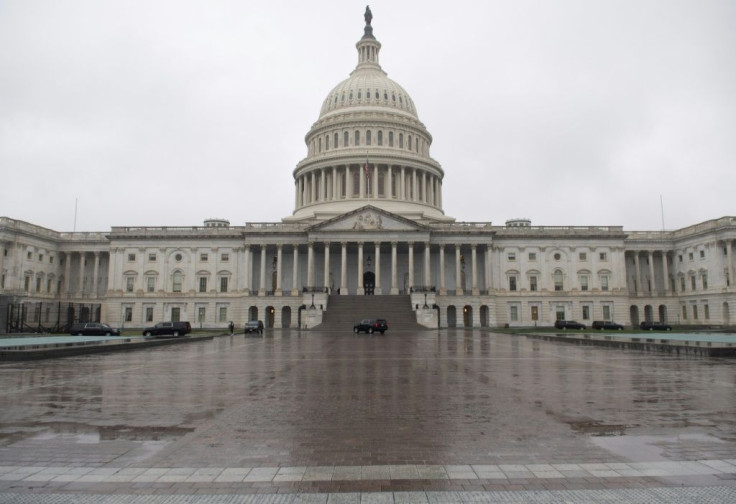One Lawmaker May Delay The $2 Trillion Stimulus Vote In House, And Everyone Is Angry

KEY POINTS
- Rep. Thomas Massie, R-Ky., is expected to oppose a voice vote
- Congressmen are worried about their health and safety if a recorded vote is called for
- President Trump said there's one grandstander who will delay the process
The $2 trillion coronavirus stimulus vote in the House may get delayed after one congressman from Kentucky hinted that he might object to a voice vote. The fear of that has forced members of the House of Representatives to fly to Washington D.C by Friday for completing the quorum needed for a recorded vote.
Rep. Thomas Massie, R-Ky., said on 55 KRC radio Thursday that he's considering rejecting the measure because the $2 trillion coronavirus relief package could spike the national debt.
"This is $2 trillion," Massie said. "Divide $2 trillion by 350 million people — it's almost $6,000 for every man, woman and child. I'm talking about spending. This won't go to the men, women and children. So , if you have a family of five, this spending bill represents $30,000 of additional U.S. national debt because there is no plan to pay for it."
$2 trillion (Congress)
— Thomas Massie (@RepThomasMassie) March 26, 2020
+$4 trillion (Fed & Treasury)
———————————
$6 trillion stimulus
$6 trillion divided by 350 million citizens = $17,000 per citizen
times a family of 4
=$68,000 per family of new national debt and dollar devaluation in this stimulus.
not a good deal
Opposing the voice vote
In the same interview, Massie also said that he is opposed to the voice vote, which does not require the vote of the majority but the loudest side -- between yea and nay -- will prevail. Both House Democrats and Republicans prefer the voice vote because it will speed up the process and it will not require their presence in Washington.
Massie's pronouncements are angering his colleagues in the House. A fellow Republican told Fox News that he believes Massie will go ahead and object to the measure. That source also has been calling congressmen and telling them get on a plane to Washington for the vote. Worse, some congressmen also worry about their health and safety amid the spread of the coronavirus in the Capitol.
Rep. Mario Diaz-Balart, R-Florida, tested positive for the virus March 18. Three Democratic lawmakers -- Rep. Katie Porter of California, and Reps. Ayanna Pressley and Seth Moulton of Massachusetts -- are self-quarantining as they await test results.
Dear @RepThomasMassie: If you intend to delay passage of the #coronavirus relief bill tomorrow morning, please advise your 428 colleagues RIGHT NOW so we can book flights and expend ~$200,000 in taxpayer money to counter your principled but terribly misguided stunt. #thankyou
— Rep. Dean Phillips 🇺🇸 (@RepDeanPhillips) March 26, 2020
“A lot of members are pi--ed off,” one source told Fox News. “If we don’t have a quorum on tomorrow, we’ll definitely have one by Saturday.”
If there is a quorum, any member from the House may ask for a recorded vote, which will result in a roll call and further delay the process by five to six hours.
Amid the possibility that a voice vote will be scrapped, House Majority Leader Steny Hoyer released a floor schedule late Thursday evening advising members to convene Friday morning. Hoyer included a cautionary advice by telling representatives to observe state and local health guidelines if they will go to Washington, D.C.
One vote, one grandstander
Meanwhile, President Donald Trump seemingly directed a comment at Massie during a White House press conference while speaking of the stimulus package.
"There could be one vote, one vote, one grandstander," Trump said. "You might have one grandstander, and for that we’ll have to come back and take a little more time."
In early March, the Congressman from Kentucky voted for the coronavirus relief package when it was tabled the first time. However, he failed to vote for the second measure as he was not in D.C.
Massie has a reputation for being " Mr. No" regardless if the measures are proposed by the Republicans or Democrats. He voted against the Hurricane Sandy disaster relief in 2013. He also voted against Trump's emergency declaration for a wall in souther border with Mexico.
Ultimately, however, the coronavirus relief package is not in danger of being thrown out. President Trump assured America that it will pass but it might "take a little longer."
© Copyright IBTimes 2025. All rights reserved.





















